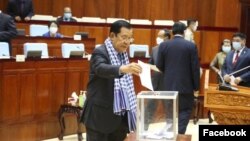The one-party National Assembly unanimously voted to pass the draft state of emergency legislation Friday morning, a law widely criticized for giving the government widespread powers to curtail fundamental freedoms and rights.
The newly-drafted law passed the lower house with 115 votes in favor, with 10 members absent from the parliamentary session. The draft law will next head to the Senate, before being vetted by the Constitutional Council and then promulgated.
National Assembly spokesperson Leng Penglong said the draft was passed by members without any changes or amendments.
After an initial draft was written up by Justice Minister Koeut Rith, the Council of Ministers added a 3-month deadline to any declared emergency, though allowing for it to be extended indefinitely. Another article, punishing government officials for not obeying the law, was added to the legislation before it reached the assembly.
“There is no change. It was totally adopted,” said Leng Penglong, the spokesman for National Assembly, adding that the law has now been sent to Senate for review.
Hun Sen last week sent a letter to Senate President Say Chhum asking him to be ready to urgently convene a session of the upper house to adopt the law.
Pointing to the coronavirus pandemic, the Cambodian government on Thursday evening announced a one-week travel ban within the country, preventing all travel between provinces, and even districts, on account of concerns garment workers were planning to disobey orders to work through Khmer New Year.
However, these conditions were tweaked on Friday and travel between Phnom Penh and Kandal province was permitted, as was travel between districts in a province.
Hun Sen, who just three days ago said there was a “0.1 percent” chance he would enact the draft “state of emergency law,” on Thursday said he would have used the law had it been passed earlier.
“If [we] would have had the Law on National Administration in the State of Emergency, it would have been implemented now,” he said, referring to the official name of the draft legislation.
The draft legislation would allow for the curtailment of civil rights and liberties, such as freedom of movement, expression, association, and assembly – all enshrined in the Cambodian Constitution – and widely criticized by rights groups.
The draft has not been placed for any kind of public consultation with international stakeholders, civil society groups and NGOs.
“Civil society can give comments via online, letters or telephone, not just directly,” he said. “It is the right time to make [this law].”
Based on Article 22 of the Constitution, the draft law requires the King to declare the state of emergency, after reaching consensus with the Prime Minister and Presidents of the Senate and National Assembly, with the state of emergency being enforced through a Royal Decree.
The draft “state of emergency” law has received strong criticism from civil society members, human rights defenders, and politicians for the wide-ranging powers it gives to the government with nearly no serious accountability.
As of Friday, Cambodia had reported 119 cases in total of the coronavirus in the country.




